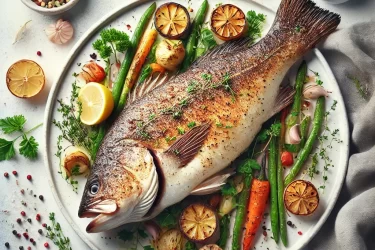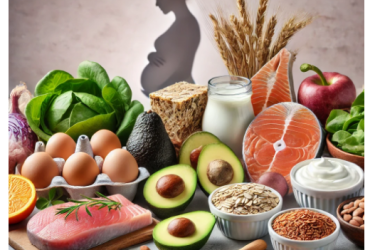Can Pregnant Women Eat Burrata? 4 Guidelines
Can Pregnant Women Eat Burrata? A Comprehensive Guide
Pregnancy is a beautiful journey filled with excitement, anticipation, and a lot of questions—especially when it comes to diet. Expectant mothers often wonder about the safety of various foods. One food that often causes confusion is burrata, a smooth, creamy Italian cheese that is becoming increasingly popular in fine dining. The question “ can pregnant women eat burrata? ” is common, and this article aims to provide a comprehensive answer, looking at both the nutritional benefits and potential risks.
Why Diet Is Important During Pregnancy
Pregnancy is a time when the body needs more nutrients. The developing fetus needs vitamins, minerals and other nutrients to develop properly, so it is important for pregnant women to consume a balanced diet. However, some foods can pose risks due to the possibility of being contaminated with harmful bacteria or containing substances that could harm the fetus.
What is Burrata?
Burrata is an Italian cheese made from mozzarella and cream. The outer shell is solid mozzarella, while the inside is stracciatella and cream, giving it a smooth and rich texture. This cheese is often enjoyed fresh, paired with tomatoes, basil, olive oil and balsamic vinegar. Its smooth, creamy flavor makes it a favorite in many dishes.
Nutritional Value of Burrata
Burrata is rich in protein, calcium, and fat—important nutrients during pregnancy. Protein helps grow and repair tissues, while calcium is essential for the development of your baby’s bones and teeth. The fat content in burrata provides a concentrated source of energy, which is especially beneficial during pregnancy when energy needs are high.
Can Pregnant Women Eat Burrata?
The safety of consuming burrata during pregnancy depends on a number of factors, including how the cheese is made and handled. The main concern with burrata, like many other soft cheeses, is the risk of Listeria contamination.
Understanding Listeria and Its Risks
Listeria monocytogenes is a bacterium that can cause listeriosis, a serious infection that is especially dangerous for pregnant women and their unborn babies. Listeriosis can lead to miscarriage, premature birth, and severe infection in newborns. Pregnant women are about 10 times more likely to get listeriosis than the general population.
Listeria Risk With Burrata
Burrata, like other soft cheeses, can be made from pasteurized or unpasteurized milk. The pasteurization process involves heating milk to a high temperature to kill harmful bacteria, including Listeria. If burrata is made from pasteurized milk, the risk of Listeria contamination is greatly reduced, making it safer for pregnant women to consume.
However, if burrata is made from unpasteurized milk, the risk of infection is higher. Unpasteurized cheese can contain Listeria, which poses a significant risk to pregnant women. Therefore, it is important for pregnant women to ensure that the burrata they consume is made from pasteurized milk.
How to Enjoy Burrata Safely During Pregnancy
For pregnant women who love burrata, there are a few ways to enjoy this cheese safely:
- Check the Label : Always check the label to make sure the burrata is made from pasteurized milk. If you eat out, don’t be afraid to ask the waiter or chef about the cheese’s origin.
- Buy From a Trusted Source : Buy burrata from reputable brands and stores that adhere to strict safety procedures.
- Fresh Consumption : Burrata is best when consumed fresh. Avoid burrata that is expired or has been left out at room temperature for a long period of time.
- Proper Storage : Store burrata in the refrigerator at 40°F (4°C) or below. If you are unsure about the freshness or safety of the cheese, it is best to err on the side of caution and not consume it.
Nutritional Benefits Of Burrata For Pregnant Women
When consumed safely, burrata offers several nutritional benefits that may support a healthy pregnancy:
1. Rich in Protein
Protein is essential for the development of your baby’s tissues and organs, including the brain. Burrata is a good source of protein, providing about 7 grams per serving. Including protein-rich foods like burrata in your diet can help meet the increased protein needs of pregnancy.
2. Rich in Calcium
Calcium is important for building strong bones and teeth for your baby. Burrata, like other dairy products, is rich in calcium. Getting enough calcium during pregnancy can also help prevent the mother from losing bone density as the baby uses calcium for its growth.
3. Source of Healthy Fats
Burrata contains fat which provides energy and helps absorb fat-soluble vitamins such as A, D, E and K. These vitamins play important roles in fetal development, including vision, immune function and cell growth.
4. Contains Phosphorus and Magnesium
Burrata also contains phosphorus and magnesium, which are important for bone and tooth formation, muscle function and overall metabolic processes.
Risks of Consuming Burrata During Pregnancy
Although burrata has many nutritional benefits, there are also risks associated with consuming it during pregnancy:
1. Risk of Listeriosis Infection
As mentioned earlier, the main concern with burrata is the risk of Listeria infection. Listeriosis can have serious consequences for both mother and baby, including miscarriage, stillbirth, and neonatal infections.
2. High Fat Content
Burrata is high in fat, which while beneficial in moderation, can lead to excessive weight gain in large amounts. During pregnancy, maintaining a healthy weight is important to reduce the risk of complications such as gestational diabetes and preeclampsia.
3. Sodium Content
Like many cheeses, burrata contains sodium, and if consumed in excess, it can lead to high blood pressure—a concern during pregnancy. It’s important to control your sodium intake to maintain healthy blood pressure levels.
Alternatives to Burrata During Pregnancy
If you’re unsure about the safety of burrata or want to avoid it, there are alternative cheeses that are safe to consume during pregnancy:
1. Mozzarella
Mozzarella is a good alternative to burrata, especially when made from pasteurized milk. It offers a similar texture and flavor but has a lower risk of Listeria contamination.
2. Ricotta
Ricotta is a soft cheese that is usually made from pasteurized milk, making it a safer choice during pregnancy. It is also lower in fat than burrata.
3. Cottage Cheese
Cottage cheese is another safe choice, rich in protein and calcium. It has a mild flavor and can be used in many dishes.
4. Cheddar
Cheddar is a hard cheese, and most hard cheeses are considered safe during pregnancy because they have a low moisture content, making it difficult for bacteria to grow.
Conclude
The question “can pregnant women eat burrata?” has no simple answer. While burrata is likely safe to consume during pregnancy if made from pasteurized milk and handled properly, it is important to be cautious due to the risk of Listeria contamination. Pregnant women should always check labels, buy from reputable sources, and ensure the cheese is fresh before consuming.
If you are concerned, consider safer cheese alternatives during pregnancy. It is important to enjoy a balanced diet that provides essential nutrients for both mother and baby while minimizing any potential risks.
By following these guidelines, pregnant women can safely enjoy burrata and other cheeses, contributing to a healthy and happy pregnancy journey.
Website: https://wilies.vn
Fanpage: https://www.facebook.com/wilimediavn
Mail: Admin@wilimedia.com













